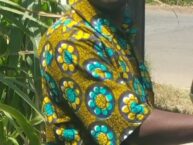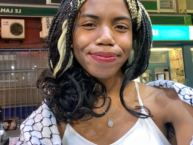Picture Frames
By Anthea Paelo
The picture frame stood empty on the bedside. Rose had been staring at it for the last half hour, tears running down her face. She held a picture of her husband. He was a big man: tall, fat and strong. The thick glasses he wore barely concealed his bushy eyebrows. The lady seated next to him carried a child. She was much smaller than the man beside her. Her features were delicate and she wore her hair combed out in an afro. The cameraman had caught the slight smile on her face as she gazed at the baby.
Rose straightened out the picture gently, smoothing out the lines, ignoring the tears that dropped on it. Her hair was now styled into a Janet haircut, the sides trimmed to allow the hair at the top to stand out. But she was still small. It was that size that had made giving birth to Okello so difficult, and made sure he would never have a brother or sister.
She had been so happy then. Daudi was the man of her dreams. He was studying to be a lawyer and had a big future ahead of him. He was also quiet. He seemed almost shy, but when he looked at Rose, he made her old worn-out and home-made dress feel like a silk gown. He would show up right after school to carry her books and walk her home. Rose supposed that was the reason she had ignored everything else: his quick temper and the dark moods. No one could be perfect. Her wedding, when it came was small. He was still studying and Rose preferred it that way. She was marrying Daudi. That was all that mattered. It had been the happiest day of her life. She did not think she would fall in love with another man, but that had changed when she first looked into her son’s face. He was a dark baby with a scrunched up face and healthy lungs. She had never encountered a more beautiful sight.
Shaking her head, she impatiently wiped her tears with the back of her hand, put the picture in her bag and then set it on the suitcase behind her. She turned around, looking at the room, as if to memorise the details. Her eyes lingered on the crib. It had been fifteen years since it had last been used but Rose had found it difficult to give it away. The wardrobe stood on the left side of the bed, one side of it holding empty hangers. Right next to the wardrobe was a sewing machine. She started towards it and then stopped, looking back at the bags behind her, a forlorn expression filling her face. She had sat at that machine and made most of Okello’s clothes, sometimes even repairing the tears when they wore thin. It stood stationary, a bright piece of kitenge material strewn over it, as if stuck in time where Rose had been making Okello a shirt two months ago. She glanced at her wristwatch and sat down, a sigh leaving her lips. The cab would soon be here.
***
Breakfast that morning had been a sombre affair – silent, except for the clink of cutlery on plates and the rustle of the newspaper as Daudi read. It had been that way for the last month or so. Rose kept catching herself listening for Okello’s footsteps, as if he was just late joining them at the table. It was while she was listening to the silence that she realised Daudi was speaking to her.
“Sorry,” her voice came out hoarse; she coughed and tried again, “sorry, what did you say?”
“I said you’ve swam in pity long enough. It’s time you let go.” Pushing his nearly empty plate of katogo aside, Daudi stood up and put on his coat.
“Pack up his things and put them in the garage. I’ll take them to church on Sunday. It’s like we are living with his ghost.” He shuddered, as if he could sense the ghost there and then.
Rose’s heart began to beat so loud, she thought Daudi might hear it.
“His things?”
“Yes, the boy’s. Everything.” He turned away from her, picking up his laptop bag.
Trembling slightly, Rose stood and whispered, “Okello.”
“Hm?” He was stuffing papers on one side of the bag.
Louder, she said, “His name is Okello. Our son’s name is Okello.”
Daudi turned and Rose did not miss the surprise on his face.
“Rose, you read the letter. You know what he was. It’s why he killed himself. ”
Daudi had always been aloof. Rose had known that when she married him but now he was cold and distant. She had thought that all he needed was a wife to give him a home. After that, she had thought that perhaps a child would warm his heart. When he still remained unchanged, she had consoled herself with the fact that he provided for everything she needed. She had been studying to be a tailor when they had met but she had never had to work after they married. Daudi had in fact insisted. But that was okay, she had got Okello soon after. And so what if it had happened when he had got drunk and left her with bruises? He had given her a son. Besides, it did not happen often and he was always sorry afterwards. It was the closest he got to warm. And if he spent more days away than at home, he always came back. But this, her child, she could not let him take from her.
“He was a homosexual. We are better off without him.” He said the word the way one would refer to a deadly disease; with dread and disgust.
“Remove his things,” he continued in a voice that brooked no response, snatching up his keys and stalking away.
Rose slid back onto her chair, deflating like a punctured tyre. For the first time, she realised and accepted that Daudi would always be Daudi. She would never be free with him. She could not even grieve for her son. Okello had not been perfect and she did not understand this gay business but he was their son. Rose would remove all his things, but she would go with them.
***
Hearing a car outside, Rose got up from the bed. It was probably the taxi. Walking toward the sewing machine, she picked up the half-made shirt and held it to her chest for a moment, then slowly folded it. She put it in the crib and wiped the dust from the machine. She was going to begin anew; first by making herself a dress. It had been a while since she had last done that. Then maybe she could make dresses for other people, even open that shop she had always dreamed of having. Maybe somehow, she would find herself again.



